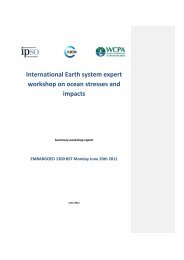magazine - Somerville College - University of Oxford
magazine - Somerville College - University of Oxford
magazine - Somerville College - University of Oxford
Create successful ePaper yourself
Turn your PDF publications into a flip-book with our unique Google optimized e-Paper software.
14 | <strong>Somerville</strong> Magzine<br />
Fighting China’s<br />
Grim Reaper<br />
A Somervillian is leading the World Health Organization’s battle<br />
against tobacco in China. But it is also a personal crusade…<br />
DR SARAH ENGLAND<br />
(1986, Medicine)<br />
The government<br />
is the sole<br />
shareholder<br />
<strong>of</strong> the biggest<br />
tobacco company<br />
on the planet.<br />
Why don’t you pick a more achievable goal,<br />
like changing the orbit <strong>of</strong> Jupiter?” This is<br />
the kind <strong>of</strong> incredulous response I get when<br />
I tell people that my job at the World Health Organization<br />
is tobacco control in China. I never tell them about my<br />
saddest day at <strong>Somerville</strong>. That was the day I passed<br />
my DPhil thesis defence and the day my father died <strong>of</strong><br />
heart disease. He had his first heart attack at 47. He was<br />
a smoker who tried over and over to quit and ultimately<br />
suffered the tragic consequences <strong>of</strong> a lifelong addiction.<br />
So, though the task is daunting, the potential to save<br />
some <strong>of</strong> the millions <strong>of</strong> lives lost to tobacco every year is<br />
as big as the Jovian challenge.<br />
While a graduate student at <strong>Somerville</strong>, I studied human<br />
genetics under the guidance <strong>of</strong> Somervillian, Kay Davies<br />
(now Dame and Pr<strong>of</strong>essor), hoping to find a treatment<br />
for disease, or a way to prevent illness. In the place <strong>of</strong><br />
genetic change, my work now is aiming at using policy<br />
change to do the same thing. Through population-based<br />
approaches, we can stretch public health funding to its<br />
greatest efficiency – prevent suffering and premature<br />
death, increase productivity and save money.<br />
In China, the scale is massive and so the tobacco stakes<br />
are huge. The government is the sole shareholder <strong>of</strong> the<br />
biggest tobacco company on the planet, run by the State<br />
Tobacco Monopoly Administration, and China is home to<br />
a third <strong>of</strong> the world’s smokers. China has more smokers<br />
than there are people in the United States, and the death<br />
toll attributable to tobacco is a million a year and rising.<br />
The World Health Organization Global Tobacco Control<br />
Report 2008 stated that tobacco, the biggest agent <strong>of</strong><br />
death on earth, will claim a billion deaths this century<br />
if trends continue, mostly in middle- and low-income<br />
countries, where the epidemic continues to grow.<br />
What policy makers are just beginning to realise is that<br />
tobacco is not only a public health issue. The 2009<br />
Global Risk Report <strong>of</strong> the World Economic Forum<br />
identified chronic disease as the third and fourth greatest<br />
threat to the global economy in terms <strong>of</strong> likelihood<br />
and severity <strong>of</strong> risk, respectively. The risk level is in<br />
the hundreds <strong>of</strong> billions <strong>of</strong> US dollars. Tobacco is an<br />
important factor in many chronic diseases and is<br />
therefore a key component <strong>of</strong> this important threat to the<br />
global economy.<br />
Luckily, as UK residents know, there are proven<br />
interventions that can stop the tobacco epidemic, and<br />
my job is to advocate with the Chinese national and<br />
municipal governments for such measures as smokefree<br />
environments, graphic warning labels on cigarettes,<br />
higher taxes and prices, smoking cessation services,<br />
hard-hitting public education campaigns, and bans<br />
on tobacco advertising promotion and sponsorship.<br />
This is in the context <strong>of</strong> technical support to China’s<br />
implementation <strong>of</strong> the World Health Organization<br />
Framework Convention on Tobacco Control. Similar<br />
in concept to the Climate Change Convention, this<br />
international public health treaty has been ratified by<br />
more than 165 parties including China. It calls for a<br />
number <strong>of</strong> measures to be taken to address the global<br />
threat <strong>of</strong> tobacco. In China, however, despite the fact<br />
that the Convention is binding law, the tobacco industry<br />
has openly published its counter-strategy and it is a<br />
formidable opponent.<br />
Enter the heroes <strong>of</strong> the story, Bloomberg Philanthropies,<br />
the Gates Foundation and the sister organisations <strong>of</strong><br />
a global partnership to fight tobacco. Mayor Michael<br />
Bloomberg together with his health commissioner Tom<br />
Frieden (now head <strong>of</strong> the USA Centers for Disease<br />
Control and Prevention) made New York smoke free.<br />
No one thought they could ban smoking in New York<br />
bars, but they did, and New Yorkers approved. The city<br />
raised tobacco taxes – people liked the way the tax funds<br />
were used. It was a popular tax! The city implemented<br />
an emotional anti-smoking campaign, gave out nicotine<br />
patches and New Yorkers quit smoking. The Mayor put<br />
his personal philanthropy behind spreading the New<br />
York experience around the globe and we have amazing<br />
success stories as a result – even in China.<br />
Last year’s Beijing Olympics were tobacco-free, with<br />
no smoking in the stands or competition areas – even<br />
outdoors – and no tobacco advertising in host cities.<br />
The legacy <strong>of</strong> the Olympics is a Beijing directive banning<br />
smoking in many locations, a greater understanding <strong>of</strong><br />
the harms <strong>of</strong> smoking among citizens, and a home-grown<br />
movement <strong>of</strong> tobacco control activists. The Olympic Games<br />
were pro<strong>of</strong> <strong>of</strong> concept that smoke-free environments can<br />
work in China. Other cities are starting to follow suit and the<br />
Guangzhou 2010 Asia Games have been declared smoke<br />
free. There is a global tobacco control movement and it is<br />
coming to China. I think my father would approve. ■

















